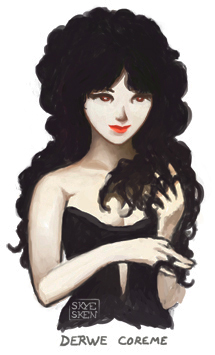Imagining the Dying Earth
The Dying Earth | Eyes of the Overworld | Cugel's Saga | Rhialto the Marvellous
The Dying Earth | Eyes of the Overworld | Cugel's Saga | Rhialto the Marvellous
| Foreword |
Jack Vance's Dying Earth saga is filled to brim with extraordinary creatures of strange origins. While reading the books years ago for the first time, my imagination was running wild with how these critters, monsters, beasts and peculiar peoples might look. I tried searching online for depictions, and only came across a couple I found of satisfactory quality and depth, so I decided to do some concepts of my own. I will cut segments from the books to accompany my illustrations.
 What got me into Vance was a translated copy of the Dying Earth that I picked up at my
local library. I thought it was masterfully translated into finnish (by
the late Yrjö Juhani Koskinen),
with many of Vance's most ingenious flourishes and adages intact and
often made into weavings of archaic finnish. I hungered for more, but
to my dismay found that my library had just two more books by Vance:
another translated collection of independent scifi-novellas (among
others, 'The Narrow Land') and an original english paperback of Madouc
from the Lyonesse saga. I ordered a bunch of old Vance books from eBay
and I haven't been able to put them down since.
What got me into Vance was a translated copy of the Dying Earth that I picked up at my
local library. I thought it was masterfully translated into finnish (by
the late Yrjö Juhani Koskinen),
with many of Vance's most ingenious flourishes and adages intact and
often made into weavings of archaic finnish. I hungered for more, but
to my dismay found that my library had just two more books by Vance:
another translated collection of independent scifi-novellas (among
others, 'The Narrow Land') and an original english paperback of Madouc
from the Lyonesse saga. I ordered a bunch of old Vance books from eBay
and I haven't been able to put them down since. Later on I want to do more of these illustration series from Vance's other books, like the Planet of Adventure, Durdane, Alastor Cluster, the Big Planet, the Demon Princes and the massive Lyonesse Saga. I had a hard time deciding which one to cover first, as all of Vance's books are so incredibly innovating and refreshing, so I started with my personal favourite, and possibly his most recognized work, the Tales of the Dying Earth, with the novellas, Eyes of the Overworld, Cugel's Saga and Rhialto the Marvellous.
Keep in mind that these concepts are how I personally imagined them to be by reading the novels. I won't be going into too much detail with these; my main take out of his is to practice my rapid visual conceptualization skills. There might exist depictions apart from these (and probably do); I have seen only few and will largely not take them into account. If you detect a major mistake amidst the depictions, please email me (skye.sken@gmail.com) and if I have time I will try to correct it.
Here's a disclaimer: I do not own rights to any of Vance's creations nor have I been commissioned to work on illustrations by the copyright holders. These works amount to fan-art, merely. Please enjoy.
| Almery |
I'll start with the 'Eyes of the Overworld', which is the beginning of Cugel's journeys (and beyond doubt the funniest book I've ever read). I'll do the 'Dying Earth' novellas possibly later, with Turjan of Miir, T'sais, Mazirian, Ulan Dhor and others. The story of 'Eyes of the Overworld' starts in Almery fair, where Cugel the Clever is selling some sort of baubles from a booth. Right off the bat we are served to the knowledge that our hero is among many things a grave-robber, who is presently peddling trinkets yanked from a lead coffin, whose previous occupant Cugel has reportedly 'discarded'. This is how Cugel is described in the first few lines of the novel:
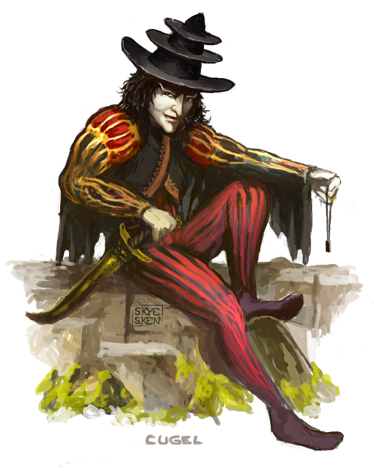 Cugel was a man of many
capabilities, with a disposition at once flexible and pertinacious. He
was long of leg, deft of hand, light of finger, soft of tongue. His
hair was the blackest of black fur, growing low down his forehead,
coving sharply back above his eyebrows. His darting eye, long
inquisitive nose and droll mouth gave his somewhat lean and bony face
an expression of vivacity, candor, and affability. He had known many
vicissitudes, gaining therefrom a suppleness, a fine discretion,
a mastery of both bravado and stealth.
Cugel was a man of many
capabilities, with a disposition at once flexible and pertinacious. He
was long of leg, deft of hand, light of finger, soft of tongue. His
hair was the blackest of black fur, growing low down his forehead,
coving sharply back above his eyebrows. His darting eye, long
inquisitive nose and droll mouth gave his somewhat lean and bony face
an expression of vivacity, candor, and affability. He had known many
vicissitudes, gaining therefrom a suppleness, a fine discretion,
a mastery of both bravado and stealth.I have to admit that Cugel is up there as one of the most entertaining characters I've encountered in literature; an unintentionally hilarious rogue, fancying himself a brilliant, beautiful cavalier with a wit like a razor, when in fact he is a long-faced cutpurse, imposter, murderer and rapist; to say the least he is a man of questionable ethics and perverse cunning. Just the first few pages of 'Overworld' give a great overview of his motivations: Cugel sets off to rob the 'Laughing Magician' Iucounu; his resourcefulness: to discover if Iucounu has any guardian beasts on the premises, he mimics the sounds of common animals to probe their presence; and the complete disregard of others in favor of his own gain, as he attempts to lay blame on the vendor who persuaded him to rob Iucounu. In many ways Cugel is a product of his world - cruel, macchiavellian, opportunistic, peculiar.
Cugel inhabits a moribund world, an Earth eon older than ours, where magic is commonplace and the peoples of the Earth scattered and often either destitute or only concerned about their immidiate lives. As the fading red sun is giving out its last, so has the Dying Earth regressed; most folk are content with a meager, simple existence. A sort of sullen fatalism in regard to one's fate is a recurring sentiment. I've heard that Gary Gygax, a creator of Dungeons and Dragons roleplaying game took a lot of inspiration from Vance's books (Cugel is obviously a classic Rogue/Thief-class).
Now, I am aware that Cugel gets his iconic many-brimmed hat much later, but I just wanted to include it in this drawing nevertheless. It's hard to imagine him without it.
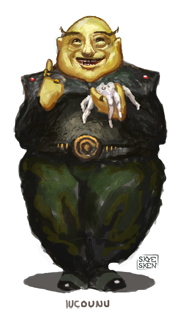
Iucounu's description: Fianosther pointed across the way to a man wearing garments of black. This man was small, yellow of skin, bald as a stone. His eyes resembled knots in a plank; his mouth was wide and curved in a grin of chronic mirth.
Here's my take on Iucounu, holding Firx, the extraterrestrial creature in his sweaty palms. I wanted to have him look kind of harmless and even dumb, as his mode of conversation brings to mind an absentminded professor. It may well be this is simply a show, but I felt that charade could be also reflected in his appearance. As a powerful wizard, he has lost much of the sense a mortal could make of him. I imagine his skin tone is the result of one too many alchemical brew ingested.
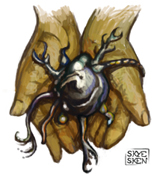 He
departed the chamber and after a moment returned with a covered glass
bowl containing a small white creature, all claws, prongs, barbs and
hooks, now squirming angrily. "This," said Iucounu, "is my friend Firx,
from the star Achernar, who is far wiser than he seems. Firx is annoyed
at being separated from his
comrade with whom he shares a vat in my work-room. He will assist you
in the expeditious discharge of your duties." lucounu stepped close,
deftly thrust the creature against Cugel's abdomen. It merged into his
viscera, and took up a vigilant post clasped around Cugel's liver.
He
departed the chamber and after a moment returned with a covered glass
bowl containing a small white creature, all claws, prongs, barbs and
hooks, now squirming angrily. "This," said Iucounu, "is my friend Firx,
from the star Achernar, who is far wiser than he seems. Firx is annoyed
at being separated from his
comrade with whom he shares a vat in my work-room. He will assist you
in the expeditious discharge of your duties." lucounu stepped close,
deftly thrust the creature against Cugel's abdomen. It merged into his
viscera, and took up a vigilant post clasped around Cugel's liver.Cugel gets caught casing Iucounu's mansion, and is forced by circumstance to do the Laughing Magician's bidding, which is to find a magical cusp from the town of Smolod in the far north. Iucounu summons a demon to transport Cugel there in a cage which the demon carries through the night to its destination, and thus our rogue is thrust on his odyssey of mishaps.
| Smolod, Grodz, Cil |
After lamenting his fate and cursing Iucounu, Cugel discovers the village of Smolod and its accompanying village, Grodz, where the servitors to the folk of Smolod toil. There exists a symbiosis between these two settlements, as the lords and ladies of Smolod carry in their eyes magical lenses with which they can view the ordinary world through the eyes of the demon Underherd, in essence, viewing the present world as the Overworld, a realization of all your dreams and hopes.
At a remote time the demon Underherd sent up tentacles to look across Earth, each tipped with a cusp. Simbilis the Sixteenth pained the monster, which jerked back to his subworld and the cusps became dislodged. Four hundred and twelve of the cusps were gathered and brought to Smolod, then as splendid as now it appears to me. |
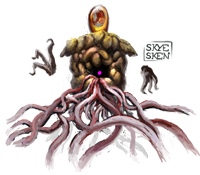 |
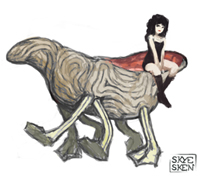 I
always imagined the boat to be a sort of tub with
luxurious cushions and possibly some steering levers or pulleys in the
"cab". As a sidenote, and I probably read this somewhere, my take
on
the magic of the Dying Earth universe is that it is such advanced
technology to be almost indistinguishable from mere magic, and that for
the most part the folks of the world have forgotten how it functions
and what
powers it; they simply know it works (except
nigh-immortal beings like Pandelume and Rogol
Domedonfors).
I
always imagined the boat to be a sort of tub with
luxurious cushions and possibly some steering levers or pulleys in the
"cab". As a sidenote, and I probably read this somewhere, my take
on
the magic of the Dying Earth universe is that it is such advanced
technology to be almost indistinguishable from mere magic, and that for
the most part the folks of the world have forgotten how it functions
and what
powers it; they simply know it works (except
nigh-immortal beings like Pandelume and Rogol
Domedonfors).After escaping from Smolod, Cugel gets into a bit of a jam with a trio of subhuman bandits, and retreats to a ruined tower nearby. With the advice of a specter bound to the ruins for all eternity, he outwits the bandits and makes short work of them. I think this segment is rather clever with the curses of the ghost and the dying bandit negating eachother; I sketched how the ghost might look - a spirit clad in tatters of a burial shroud, proud and terrifying.
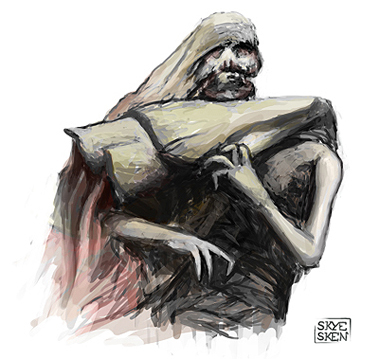
"Demolish this fort. While stone joins
stone I must stay, even while Earth grows cold and swings through
darkness."
Cugel happens to ask for directions from a group of sea-shell wearing faelike beings having fun and prattling amongst themselves on a lonely beach.
At the far end, where the ocean surged and dark water heaved, four large shells had attached themselves. These now were open; heads looked forth, attached to naked shoulders and arms. The heads were round and fair, with soft cheeks, blue-gray eyes, tufts of pale hair.
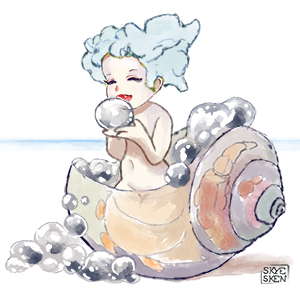 I
envisioned this cute but cursed little creature, happy
with its
companions despite its strange condition. The text
mentions them to be
fair of appearance, but I figured them either too alien or not pretty
enough to warrant any sort of empathy on part of Cugel - so maybe
instead they look sort of
annoying, or possibly he just doesn't hold such mutants in a high
regard. They'd be kind of like mermaids but fused with
crabs, so crabmaidens, with their shells acting as a sort of pool that
they dwell in and store vital water while they are away from the ocean.
Of note was their ability to magically mold intricate objects from
water, as well as placing hexes on others.
I
envisioned this cute but cursed little creature, happy
with its
companions despite its strange condition. The text
mentions them to be
fair of appearance, but I figured them either too alien or not pretty
enough to warrant any sort of empathy on part of Cugel - so maybe
instead they look sort of
annoying, or possibly he just doesn't hold such mutants in a high
regard. They'd be kind of like mermaids but fused with
crabs, so crabmaidens, with their shells acting as a sort of pool that
they dwell in and store vital water while they are away from the ocean.
Of note was their ability to magically mold intricate objects from
water, as well as placing hexes on others.They slight him by soiling his clothes and Cugel mauls one of them by smashing its shell with a heavy stone. As his last act, the creature places a malediction on Cugel. I found this to be one of Cugel's darkest moments, as the critters of the sea seemed so innocent and full of gaiety, undeserving of such demise at the cruel hands of Cugel for the harmless gag they played on him.
[...] He seized a heavy rock and dashed it down upon the shell, crushing it. Snatching forth the squealing creature, Cugel hurled it far up the beach, where it lay staring at him, head and small arms joined to pale entrails. In a faint voice it asked, "Why did you treat me so? For a prank you have taken my life from me, and I have no other."
In the following chapter, where Derwe Coreme is explored in more detail, it is heavily implied she is in fact somewhat versed in magic, at least her footmen seem to think so ("The wiles of Derwe Coreme exceed my understanding. By some device she learned of your presence and so has issued the invitation which you have just heard."; "The sergeant looked at Derwe Coreme, who laughed. "As I bade you, or fear my revenge, which is as you know.""). She is further delineated when Cugel reaches the palace of Cil, where she resides and holds sway over the region as the ruler, as the true ruler, Slaye, has lost his amulet of power and is unable to oust Derwe Coreme, so obviously she is somewhat capable of witchcraft, otherwise being a frail, anemic girl.
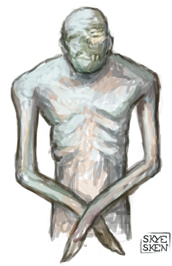 As
Cugel enters the weather-worn yard to the palace of Cil, he is stalked
by a ghoul, hiding amongst the
statues to the foregone rulers,
and barely escapes the thing with his life. The
creature is narily explained in any great detail (other than being
white of hue and vampiric in nature), but I imagined it as a gaunt,
freakishly tall abomination. I made just a fast sketch:
As
Cugel enters the weather-worn yard to the palace of Cil, he is stalked
by a ghoul, hiding amongst the
statues to the foregone rulers,
and barely escapes the thing with his life. The
creature is narily explained in any great detail (other than being
white of hue and vampiric in nature), but I imagined it as a gaunt,
freakishly tall abomination. I made just a fast sketch:As Derwe Coreme is about to have Cugel murdered for the amulet he accidentally discovered, Slaye interferes and summons a black demon by fiddling with the amulet in Cugel's possession to kill all in the room save him. Cugel and Derwe Coreme accidentally conjure up another supernatural entity, called Vanille, to combat this beast but it is ultimately ripped apart by the black demon. Cugel is forced to relinquish the amulet, and he and Derwe Coreme are cast out of Cil.
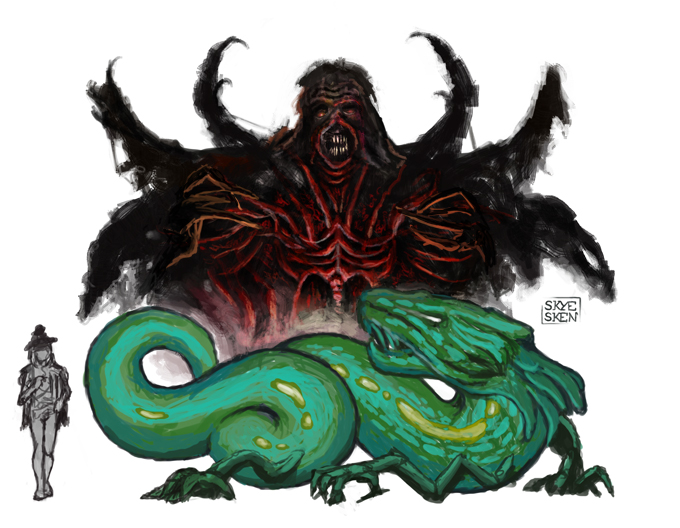
| The Mountains of Magnatz |
Having escaped Cil, Cugel travels towards the foreboading Mountains of Magnatz in the south with the exiled Derwe Coreme accompanying him. With moderate complexity it is now explained that Cugel immidiately takes advantage of the now vulnerable Derwe Coreme! I actually did not even catch on to this on my first reading years ago; with such finesse it is described:
Cugel clapped his arms and jigged back and forth, while Derwe Coreme stood pinch-faced and limp beside the old byre. Cugel presently became irritated by her posture, which implied a subtle disparagement of himself. [...] For a brief period after their expulsion from Cil she had carried herself with an inappropriate hauteur, which Cugel had tolerated with a quiet smile for himself. Their first couching had been both eventful and taxing; thereafter Derwe Coreme had modified at least her overt behavior. Her face, delicate and clear of feature, had lost little of its brooding melancholy, but the arrogance had altered, as milk becomes cheese, to a new and wakeful appreciation of reality.
As if this wasn't insult enough, later on the pair come across a tribe of busiacos living near the Great Elm forest, who are described as thus:
The rogues did not improve upon closer view. Their hair was long and, matted, their faces gnarled,
with eyes like beetles and mouths showing foul yellow teeth.
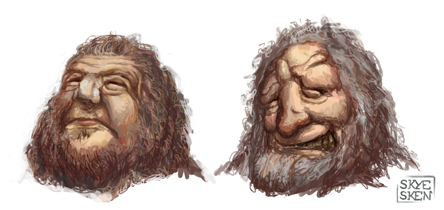
Cugel ends up getting swindled by these wily brutes, and consequently sells Derwe Coreme to them in exchange for information on how to evade first "glass reptiles" (imaginary beings no doubt), and later beasts called 'erbs' and 'grues' while trudging through the Great Erm to reach the Mountains of Magnatz. These creatures are not described further in any way, though I vaguely recall that it is done later in the novels, so I won't attempt any depictions at the moment. Obviously she protests her fate both verbally and physically, but is "silenced by some means Cugel did not observe."
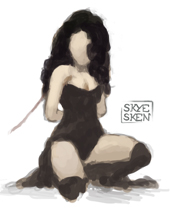 I
find it amusing how comedically ruthless and practical everyone is
in these novels: there is a moment where Cugel, upon realizing that
he's been cheated and that the "shortcut" he was lead on was nothing
but a ruse, ponders on whether to return and rescue Derwe Coreme from
servitude and slavery to the filthy and loutish busiacos. Were this
your average hero no doubt he would have attempted such an action, but
I suspect here Cugel is regarding the beautiful Derwe Coreme more as
his possession having been stolen than a human being taken against her
will, and even so ultimately decides against a return, and just leaves
her to "come to terms with her new
life." Savage.
I
find it amusing how comedically ruthless and practical everyone is
in these novels: there is a moment where Cugel, upon realizing that
he's been cheated and that the "shortcut" he was lead on was nothing
but a ruse, ponders on whether to return and rescue Derwe Coreme from
servitude and slavery to the filthy and loutish busiacos. Were this
your average hero no doubt he would have attempted such an action, but
I suspect here Cugel is regarding the beautiful Derwe Coreme more as
his possession having been stolen than a human being taken against her
will, and even so ultimately decides against a return, and just leaves
her to "come to terms with her new
life." Savage.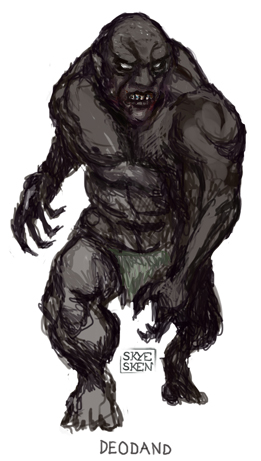 Cugel
finds himself in a halfway inn leading to the mountains. The patrons he
meets there (among others, a witch-chaser wearing tall black boots)
explain that only a fool would attempt the route across the mountains,
as the trail is fraught with perils. The innkeeper attempts to sway
Cugel to relinquish what little possessions he has, explaining that a
dead man has no need of wealth. In the end Cugel opts to take the route
anyway, as the alternative to crossing here would be even more arduous
and possibly lethal (there is a mention of a city besieged by
basilisks, which I found intriguing... but it is never explained in
more detail). As he was forewarned, Cugel soon finds himself stalked by
a deodand:
Cugel
finds himself in a halfway inn leading to the mountains. The patrons he
meets there (among others, a witch-chaser wearing tall black boots)
explain that only a fool would attempt the route across the mountains,
as the trail is fraught with perils. The innkeeper attempts to sway
Cugel to relinquish what little possessions he has, explaining that a
dead man has no need of wealth. In the end Cugel opts to take the route
anyway, as the alternative to crossing here would be even more arduous
and possibly lethal (there is a mention of a city besieged by
basilisks, which I found intriguing... but it is never explained in
more detail). As he was forewarned, Cugel soon finds himself stalked by
a deodand:...taller and heavier than himself, black as midnight except for shining white eyes, white teeth and claws, wearing straps of leather to support a green velvet skirt.
Our hero outsmarts the creature by maiming it with a large rock. In an attempt to spare its wretched life, the deodand offers to lead Cugel by such paths as to evade its ilk, and an agreement is made (and enhanced by a collar and rope by which Cugel controls the creature of dread). Soon enough Cugel and his captive are being pursued by several deodands, only keeping their distance due to the signs of their imprisoned kin. Once again Cugel is saved in the nick of time by a group of woodsmen, who summarily execute the deodands and take Cugel as their guest into their mountain village of Vull.
Here Cugel meets the hetman Hylam Wiskode, who tours Cugel through his small village. It becomes apparent that the old Watcher, having his post high atop the village in a cupoled tower has perished, and a new one must be appointed with haste. Cugel, enticed with the various benefits the position endows offers himself as the replacement Watcher. One of the perks of the profession is the freedom to select any maiden from the village as your spouse. During that night's merrymaking and dancing Cugel spots the young Marlinka, who he decides upon. Cugel attempts to bed her without due delay, but the girl manages to elude him in the crowd, much to the rogue's dismay.
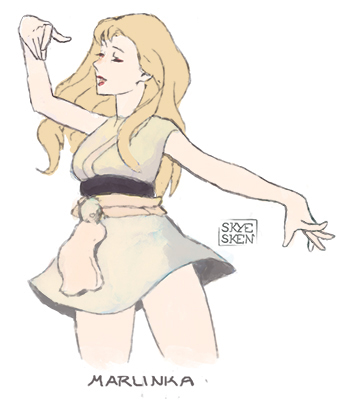
 Taking
his post up in the slender and simplistic five hundred feet tower,
Cugel soon discovers that he has been once again been taken for a ride:
the watchtower has none of the
niceties he was promised, the food is rather stale and barely
sufficient, and the bed a
disreputable pallet. To add insult to the injury, Cugel is
deliberately trapped in the tower, without means of descent.
Taking
his post up in the slender and simplistic five hundred feet tower,
Cugel soon discovers that he has been once again been taken for a ride:
the watchtower has none of the
niceties he was promised, the food is rather stale and barely
sufficient, and the bed a
disreputable pallet. To add insult to the injury, Cugel is
deliberately trapped in the tower, without means of descent. Before departing the tower, the hetman explains the goal of the watch: to keep an eye for a mythical villain called Magnatz, and indicates two objects of import in regard to this simple task. First, the optical device with which the watchman can spectate far away lands; second, a rope which sounds the great gong, indicating Magnatz's return. The hetman further deliberates that ringing the gong in any other circumstance brings about an unusually cruel penalty: the perpetrator is ripped apart with chains and his remains tossed into the whirlpools of the lake nearby.
There are some interesting bits of lore in this segment, and it's a shame they are not explored further: Guzpah the Great, who brought eight armies to attack Magnatz; Mount Temus, Merce, Padagar Pass, and the titanic ruins where Magnatz's palace allegedly was situated. Casual mentions like these which Vance makes from time to time help bring the dying earth universe to life and set my imagination running wild.
Cugel, however, is not called (by himself) 'Clever' for nothing. He discovers a way to escape the tower: by using a cloth rope tossed around the shaft of the tower he descends one small hop at a time. In the dead of the night, he takes revenge on the villagers of Vull, robs their treasury and abducts Marlinka, who is further pacified by the horror of the realization that no one is attending the tower, and again Cugel displays his lack of mercy by forcing himself upon the girl.
At this point, Magnatz awakes from his slumber and as before Cugel only barely escapes with his life. I guess the whirlpools of the Vull Lake were meant to be the inhaling and exhaling of this enormous creature. Magnatz is not described in any great detail, so I just drew how I imagined him to be: for some reason I felt he would have a very vacant gaze, like a titan gazing on ants before brushing them off. I don't think he would be humanoid, nor very man-looking, as his proportions are so much grander; he would be partially covered by underwater vegetation, having slumbered for so long as to almost be forgotten.
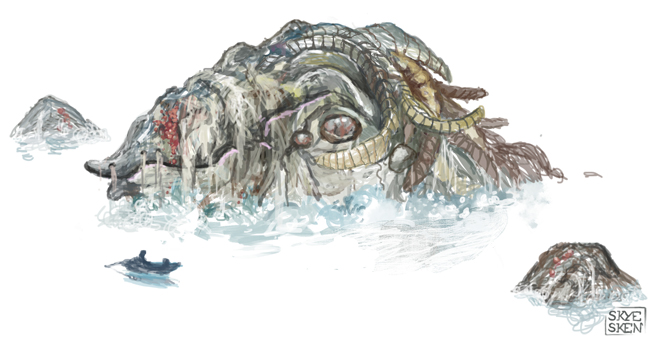
| The Sorcerer Pharesm |
Iucounu, upon discharging Cugel on this mission for the cusp, provided him with a magical amulet capable of turning the inedible to edible, but... the substance in question will retain its taste, however nourishing the amulet makes it - an example of the mordant humor of Iucounu the Laughing Magician. Funnily enough, at the beginning of this chapter we are catered to the knowledge that Cugel, in order to survive has had to devour the literal refuse of a bearded thawn to survive! I can't stop the laughter when I read this part. I think a lot of Vance's humour comes from the sheer absurdity of the situations his characters get themselves into, delivered with an earnest but highly convoluted way, alike the author was describing an advanced scientific process, when in fact his hero is, well... eating shit.
Trudging through a vast stony plain, Cugel comes across a strange excavation, where seemingly incomprehensible forms have been cut into the rock crevasses. He meets a gang of workmen who have been commissioned by someone called sorcerer Pharesm. His purpose is to lure an otherworldly, dimension-travelling being called TOTALITY by creating the perfect surrounding to attract this creature, and this arduous project has been underway for over three hundred years.
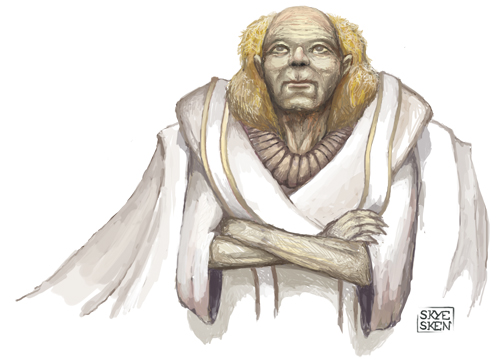
Pharesm, being very focused, neat and diligent about his project, seemed like someone who would not flaunt with his clothing or apparel, thus I did not draw him as a motley, embellished sort of wizard with a pointy hat, the beard, a staff and the like (none of these were described anyway). I think Vance often attempts to steer away from archeotypes in his writings, to reach a certain uniqueness.
The workmen are apparently rather peculiar in their appearance: the overseer has a forefinger that can extend to great lengths at will, while others vary wildly in shape and size. This had me thinking that possibly Pharesm has somehow transmuted some of the workers to further suit his needs for precise rock-hewing. Ah, this place is wondrous in its adventitiousness!
I found very intriguing the depictions of Pharesm's work-camp. He has some sort of a compound nearby where the workmen gather during the nights, study literature (among others, Insect Identification, the Heraldry of the Kings of Old Gomaz, Unison Chanting, Practical Catalepsy and Orthodox Doctrine...), engage in nympharium privileges, and where the wizard's laboratories and the like are situated. The palace is further described below; I made a small sketch of how I imagined it.
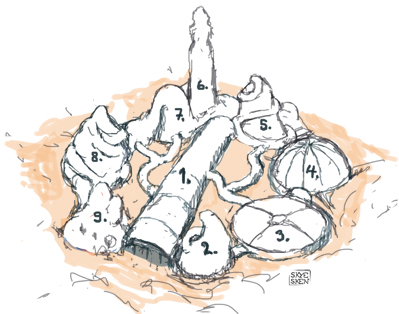
[...] a long low building of melted rock surmounted by eight oddly shaped domes of copper, mica and bright blue glass.
1. Main Hub
2. Nympharium
3. Refectory
4. Gardens
5. Workers' Quarters
6. Wizard's Tower
7. Work-room
8. Divinatory
9. Conservatory
The hungry Cugel is turned away by Pharesm, who performs a divination on his fingertips and decrees him unsuitable for employment in his work-gang. Disappointed and with his stomach grumbling, Cugel walks away, only to encounter something strange:
[...] he spied a most peculiar creature: essentially a gelatinous globe swimming with luminous particles from which a number of transparent tubes or tentacles dwindled away to nothing. Cugel bent to examine the creature, which pulsed with a slow internal rhythm. [...] The creature displayed qualities reminiscent of both coelenterate and echinoderm. A terrene nudibranch? A mollusc deprived of its shell? More importantly, was the creature edible?
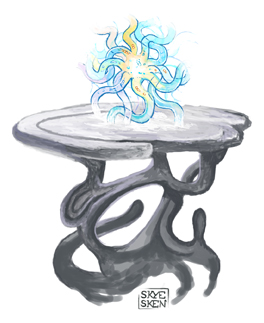 This
of course is the much-anticipated TOTALITY,
and Cugel ends up first tormenting the small critter by prodding it in
his curiosity, then charring it on a brazier and devouring it.
Pharesm's reactions, when he hears of this, are utterly priceless ("should
I explode you this instant into the most minute of your parts the
atonement would measure one tenmillionth of your offense").
This
of course is the much-anticipated TOTALITY,
and Cugel ends up first tormenting the small critter by prodding it in
his curiosity, then charring it on a brazier and devouring it.
Pharesm's reactions, when he hears of this, are utterly priceless ("should
I explode you this instant into the most minute of your parts the
atonement would measure one tenmillionth of your offense"). Imagine having worked diligently for five hundred years for naught! Enraged, he ends up dragging Cugel with him to his workroom and after some clairvoyance, sends the rogue millions of years into the past with powerful magic to track down the time-traveling oddity, then bring it into contact with an ivory disk representing NULLITY (which apparently traps TOTALITY in place).
Cugel wakes up to a world lit by a wan light from an orange sun. He witnesses the Winged Beings, apparently denizens of a dark moon orbiting the Earth, only visible when it casts its shadow upon the sun. They serve the Great God Yelisea by taking a person who about to die and bringing him or her to the blessed land Byssom, as explained by the Farwan elder later on. The exact reality of the situation was a bit unclear to me, but this was the arrangement of the Winged Beings and the Farwans.
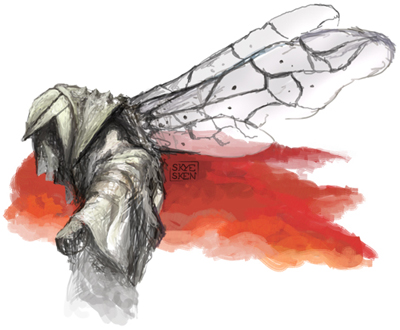
A great winged creature wearing white robes flapped on high along the face of the cliff. The wings were long, ribbed with black chitin, sheathed with grey membrane.
Possibly these creatures were parasitic/vampiric and consumed for their sustenance the old and feeble of the Farwan people, and why not other such communities as well. The dark moon in which they dwell seemed to me like an artificial satellite, orbiting the Earth, but it could just as well be a legend. The winged beings were not detailed much, so the drawing is likewise vague.
The Folk of Farwan accept Cugel amongst them for a time. It's curious with how much detail Vance describes these people:
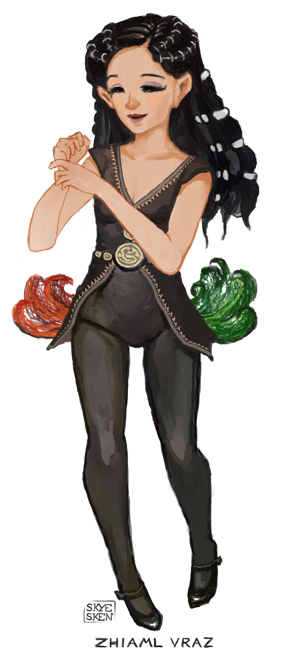
The villagers were of a type he had never before encountered, of no great stature, with generally large heads and long restless arms. Their skin was a rich pumpkin orange; their eyes and teeth were black; their hair, likewise black, hung smootly down beside the faces of the men to terminate in a fringe of blue beads, while the women wound their hair around white rings and pegs, to arrive at a coiffure of no small complexity.
The features were heavy at jaw and cheek-bone; the long wide-spaced eyes drooped in a droll manner at the outer corners. The noses and ears were long and were under considerable muscular control, endowing the faces with great vivacity.
The men wore flounced black kirtles, brown surcoats, headgear consisting of a wide black disk, a black cylinder, another lesser disk, surmounted by a gilded ball. The women wore black trousers, brown jackets with enameled disks at the navel, and at each buttock a simulated tail of green and red plumes, possibly an indication as to marital status.
Once again, while speaking to the Farwan Elder, Cugel is made privy to excellent details from this land lost in time. Among mentioned are places like Impergos, Tharuwe, Rhaverjand and the illustrious Sembers, whose peoples expelled the star-pirates, brought the sea to the Land of Platforms and whose Padara Palace is reknown for its splendor. I love this attention to minute detail; Vance knows how to tickle the mind's eye.
Cugel meets a native Farwan girl called Zhiaml Vraz and, allured by her charms, ends up sleeping with her in his reserved inn room (apparently furnished with ... a painting of a peculiarly ugly baby which seemed trapped or compressed in a transparent globe...). However, nothing can ever go smoothly for Cugel it seems, as the next morning he is accused of heresy for not performing 'the sacred rites' during his erotic congress with Zhiaml Vraz, and for similar excuses. It seems that even a million years in the past, our hero is still serving as the butt of this conspiracy and that. The villagers leave him for the Winged Beings' mercy. After a small bout with these cruel creatures, Cugel manages to locate TOTALITY and escapes back to his present time, only to find that the plan had not realized and the precious cosmic mollusc had evaded their grasp.
Despite his (deserved) harshness towards Cugel at some points, Pharesm is merciful and even compassionate. He feeds Cugel (albeit only after his slight), and does let him live even when he fails the mission, which is much more than most folks would have allowed him after his disasterous deeds.
As a sidenote, during his rant, Pharesm mentions that Cugel has possibly caused untold destruction while prodding, roasting and finally digesting TOTALITY, as the creature is in actuality some sort of symbolic, living representation of all of space, with its tentacles being infinite possibilities... or something to that nature. Taking this into account, and assuming Pharesm wasn't exaggerating or bluffing (or wrong), this might have been the most pernicious of Cugel's meddlings.
| The Pilgrims |
Beyond a desolate salt waste, Cugel comes upon an inn on the bank of a river. He attempts to pay patronage to this establishment, but discovers that the only reputable room and the single dinner fowl are reserved for a certain Lodermulch, a somewhat ill-tempered, muscular fellow, whom Cugel at once begins to plot against. Cugel manages to trick and humiliate Lodermulch, setting the relationship of the two on a rocky path, considering that Cugel befriends and joins the group of pilgrims with whom Lodermulch is traveling with and must thus share the road with him. Among the pilgrims are Garstang, who is the wise leader; Voynod, a wizard of some repute (likely not too recognized, considering his eventual fate) and Subucule, a fanatic follower of Gilfig - the divinity that the pilgrims worship.
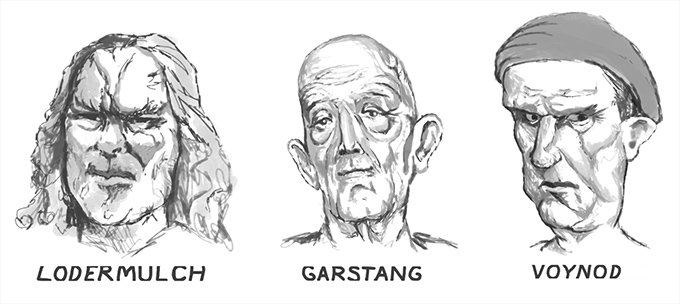
The pilgrims are bound to the city of Erze Damath to attent something called the Lustral Rites at the Black Obelisk. The companions set off, marching through the day and resting during nights, protected from various monsters (deodands, erbs, hoons and gids) by a magical barrier erected by the wizard Voynod. None of these creatures is described further with detail, so I won't attempt to illustrate them; however, Voynod's cage of shards which he conjures up from a circlet of ivory slivers is an interesting trinket.
As the companions reach a confluence of the river Scamander, they decide to carry on the voyage by constructing a raft. Aboard the raft, we are catered to a small glimpse into Cugel's view on theology, as the pilgrims inspired by boredom begin to discuss wonderful metaphysical concepts and their applications. Cugel, as expected, seems to be as practical in faith as in many other areas of his thinking - he describes himself as syncretic, noting several ludicrous concepts by which he has arrived to his conclusion.
After some mishaps and Cugel apparently casually murdering Lodermulch during the night to obtain a magical salve he possessed, the party finally reaches the vast city of Erze Damath. Here, with some chicanery Cugel also manages to be rid of Voynod, claiming his valuable trinkets. Cugel then trades some of these to a clergyman in order to trick the party of pilgrims to voyage beyond the perilous Silver Desert, to reach a certain fane at the shore of the Songan Sea and abase themselves there. This whole ruse Cugel concocts as a means to amass a troop of at least 40 men that are needed to cross the desert, as Cugel needs to get to the shore and get across to reach Almery, home. Making use of the deep devotion of the assembly, the clergyman manipulates a sacred statue of Gilfig to deliver a "divine" message, obviously penned by Cugel. Once again Cugel demonstrates with his actions that all personal traits beyond cold reason and practicality are deficiencies to be abused.
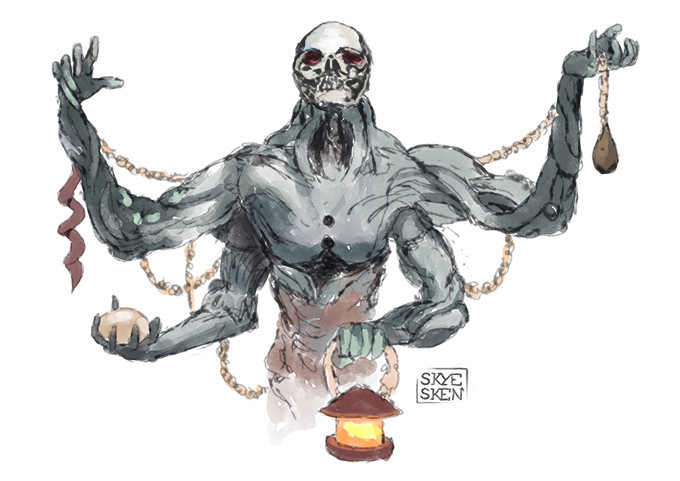
A note of interest is explored when the pilgrims are purchasing steeds for their odyssey: the beasts are all unique mutants whose ancestors were artificially created by the wizard Follinense as an ordain from the Mad King Kutt. These beasts were later let loose upon the countryside, apparently as a prank or mischief? At any rate, there's a short passage read from Follinense's folio about some other creatures of the realm:
'Gid: hybrid of man, gargoyle, whorl, leaping insect.
Deodand: wolverine, basilisk, man.
Erb: bear, man, lank-lizard, demon.
Grue: man, ocular bat, the unusual hoon.
Leucomorph: unknown.
Bazil: felinodore, man, (wasp?),'
These notes may prove useful later, when attempting depictions of said creatures, if more details on them surfaces. I am sure some of them are featured in the other novels.
The voyage across the desert becomes the fate of most of the pilgrims - one more practical joke of Cugel's that ends up costing dearly for those associated with him. The party's numbers are trimmed heavily by general mishaps, bouts of madness, bandit ambushes and unexplained disappearances, but some manage to reach the shore of the Songan Sea. No fane is in sight, and almost all of the rest of the survivors lose hope. A tumbledown village inhabited by a tribe of lizard-folk is spotted, and some of the pilgrims decide to overpower it and install themselves as the lords of this village.
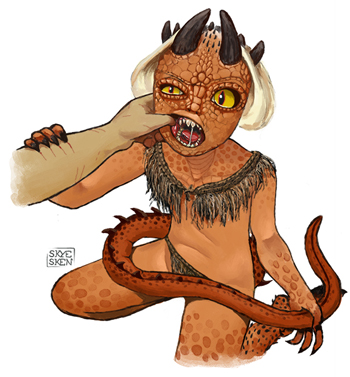 In
my mind I saw this race of lizard-kin as a sad, almost extinct tribe -
possibly a creation of some ancient wizard, but devolved to a point
where they've gone feral, no longer dressing in clothes or exhibit a
culture beyond basic survival and hierarchy. They would have some
features of man and lizard both, but be small of stature to be so
easily overpowered by famished, poorly armed rabble.
In
my mind I saw this race of lizard-kin as a sad, almost extinct tribe -
possibly a creation of some ancient wizard, but devolved to a point
where they've gone feral, no longer dressing in clothes or exhibit a
culture beyond basic survival and hierarchy. They would have some
features of man and lizard both, but be small of stature to be so
easily overpowered by famished, poorly armed rabble. The pilgrims selectively only massacre the males, so obviously they find the females essential to some degree. The teeth of the females are forcefully filed, meaning that likely not only the males are confrontational towards the invaders, but despite that, they are not slain. In fact, the pilgrims dress them in clothing made of reeds! Well, to me this alludes to some sort of nasty, inter-species dealings, unbecoming of devout followers of Gilfig.
Cugel presses on with only Garstang, Subucule and Casmyre. During the night the companions are entranced by a ghostly city appearing over the water of the sea, beckoning them to stay and watch. Realizing this is a vampiric ruse of some sort, they depart hastily, but lose Casmyre who wishes to end his life basking at the awe of the phantasmal carnival, eating away at him. Subucule decides to part ways with the two later as well, daring the Silver Desert. It is doubtful he would survive.
Cugel and Garstang discover a village peopled by a folk of ferocious aspect. Despite having apprehension, the two decide to commandeer a boat. They are caught, however, but find that the villagers are, despite their appearances, gentle and kindly. The two are outfitted with a boat and supplies, and are sent off with celebrations and goodwill. There is a rather funny scene here, where Cugel and Garstang are forced to excise their fingers into a ceremony dish as a social custom.
Crossing the Songan Sea, the pair reach the shores of what appears to be Almery. They notice a village, and assume such geniality from the beautiful, golden-haired denizes as they enjoyed in the previous hamlet, but are in stead greeted with violence, the dwellers proclaiming to worship a certain inexorable god, Dangott, and threaten to feed the two to the sacred apes. Garstang is slain, but Cugel, with the help of a magical trinket manages to escape with his life. Here I see one of the most humane moments of Cugel's adventures - he sincerely attempts to save the life of Garstang, though proclaiming to act out of malice towards the mad villagers, I suspect he really cared for the old man.
| The Cave in the Forest |
Our hero ventures into a grand forest, though not knowing his bearings decides to counsel with a certain Zaraides, a sage who promotes his trade with pamphlets spread across the forest. Not too surprisingly, this is also a shrewd design - Zaraides has been taken captive by a breed of rat-folk small of stature but cruel of nature. Cugel almost unknowingly evades captivity as he persuades a man called Fabeln to test the cave Zaraides apparently dwells in, but is in stead tricked by Fabeln in turn, who lures Cugel into the same trap.
The rat-folk have an ultimatum for each captive: one must procure two captives in one month's time to earn their freedom, or be devoured. In its simplicity, this is a genius ploy, as it gives a glimmer of hope to the imprisoned, while appealing to their most base emotion - selfish individuality. A point must be made here that most denizens of the Dying Earth seem to completely lack a certain dignity or rather, a sense of self-sacrifice. It is hard to define, but what I mean is that everyone seems to be almost wholly concerned about their matters only. There is no empathy, no shame, nor an appeal towards "general good"; only in the broader sense and temporarily, and only if it directly profits oneself for the moment. In short, the people have devolved into a sort of primal state, where survival is key. There is still the charade of honor and dignity on display, but it is exercised in words mostly, not in action. One curious exception to this is the "law of equivalence", sometimes quoted by various individuals, apparently being a widely-recognized dogma. It dictates roughly that if an action of another causes one either great harm or great gain a debt is manifested, which must be paid back.
Zaraides, apparently a wizard, lamenting his stolen portfolios and spells confesses to having crafted the advertisements as a way to entice passerbys to the ratfolk den, but his "catches" are not tallied, being waved off with vague arguments, suggesting that the rat-folk do not intend to free anyone. Despite this, Fabeln, counting Cugel as one of his tally, decides to bring in his own daughter as his second tally, who, according to him has become a burden as of her mooning and subsequent disinterest in gathering wild leeks. This is the kind of behavior I mean - a total lack of concern even for one's immediate family. It is at once humorous, and on the other hand monstrous.
Cugel manages to outwit Fabeln while confronting his daughter. Fabeln, in an apish rage towards Cugel protests violently against his captors and is killed by the rat-folk; Fabeln's daughter is taken captive. During a tumult in the night, Cugel manages to escape the dungeon and locates a store-room, where he discovers the spells of Zaraides. Being harried by the rat-folk, he casts the spell of Inside Out and Over, completely unearthing the den in a fierce upheaval of soil, exposing the rat-folk to their old enemies, inhabiting a system of caves beneath the den - a bloody battle between the two groups ensues, and few survive.
| The Manse of Iucounu |
Scouring the mess for loot and Zaraides' spellbook, Cugel, to his dismay discovers that the wizard has found them first. Fortunately, he is rather grateful for not becoming the fare of the rat-folk and decides to reward the rogue. They travel together to Zaraides' magnificient tree-home situated amidst the branches of an immense daobado, where the sage extracts Firx from around Cugel's liver with an alchemical concotion. Cugel pleads for aid in his vendetta against Iucounu the Laughing Magician, but Zaraides declines, stating he would not exchange jests with such a notorious jester. He does, however, conduct our hero back to Azenomei, at the juncture of the Xzan with the Scaum, where our story began.
Forgiveness far from his mind, Cugel concocts a cunning scheme which involves the violet cusp he was sent to retrieve in the first place. The cusps are not meant to be spectated with one eye only, as the disparity between reality and overworld causes the spectator to suffer a dazing bout, losing consciousness momentarily. Utilizing the services of a local glassblower, Cugel manages to get a hold of a glass cusp, virtually identical to that magical cusp of the demon Underherd. His plan is to tender the fake cusp to Iucounu, with the intent that upon looking through both the fake cusp and Iucounu's own would paralyze him, allowing Cugel to take control.
In Iucounu's mansion, things have taken a turn for the strange: Cugel realizes the magician has been possessed by a creature similar to Firx. Making use of this entity's lack of knowledge towards the magical arts, Cugel tricks it to cast a stupefying spell on itself. Now in possession of his most hated enemy, Cugel proceeds to first extract that abominable presence of the Firx-like creature from Iucounu, then humiliating the magician in a variety of shows, one of which is to insert him into a large glass tube, then assist a local peasant in retrieving missing possessions from the bottom of a well by lowering the Iucounu-tube into it. Priceless.
While enjoying Iucounu's wealth, Cugel begins to delve into the magician's folios and manages to learn a few spells, though for him, who is not so well-versed in the art, the task seems almost insurmountable. The mechanics of magic are not detailed too precisely, but the act of memorizing spells serves to "occupy" a certain space from one's mental capacity. A layman may only memorize the simplest of spells, while a master could cram one or two complex ones into his memory.
One or two of the work-books he found susceptible to his understanding. These he studied with great diligence, cramming syllable after wrenching syllable into his mind, where they rolled and pressed and distended his temples. Presently he was able to encompass a few of the most simple and primitive spells, certain of which be tested upon lucounu: notably Lugwiler's Dismal Itch. But by and large Cugel was disappointed by what seemed a lack of innate competence. Accomplished magicians could encompass three or even four of the most powerful effectuants; for Cugel, attaining even a single spell was a task of extraordinary difficulty.
Fianosther, the shopkeeper who persuaded Cugel to attempt to case Iucounu's mansion makes an appearance and demands a rightful share of the loot, as in his twisted logic, he was the one who sent Cugel on the mission in the first place, and were it not for his actions the rogue would remain penniless. Enraged, Cugel decides to hurl a few destructive spells onto both Fianosther and Iucounu, still gagged and helpless inside the glass tube. His first spell fails, due to a misremembered syllable, and the second - the very spell Iucounu cast upon him to propel Cugel to the other side of the world - he mistakingly casts upon himself, and presently is brought back into that accursed place from whence he began his journey home. Here he sits, looking to the sea, lamenting his cruel fate.
| Closing words |
The chief complaint one could make of this book is that Cugel does not seem to have any sort of character progression arc. After his adventure, one could assume (and be reinforced by reading Cugel's Saga) that he remains as he was, unaltered by the many harrowing experiences he suffered through. The chief theme of this book seems to be its unending imagination towards creating a vivid world that seems to breathe and pulse as you read on. I would argue that it is a comedy, and thus the characters must appear a certain way - their features exaggerated to the extreme, their responses, their mere existence drastic and unthinkable. And in that it exceeds all expectations, being one of the most ludicrous pieces of literature I know.
Cugel may very well be one of the more detestable antiheroes in fantasy fiction, but he has his moments. As I mentioned before, he is a product of his world; many, if not most of the characters and creatures he encounters offer him nothing but endless intrigue and hostility, even on first glance, thus he cannot always be blamed for the woe he sets in motion. If nothing else, he is an agent of change, of chaos - things almost invariably take a sharp turn for the worse when Cugel appears.
Cugel's story continues in the next installment of the Dying Earth series - Cugel's Saga. It is a worthy continuation of his adventures, and a must read for anyone who enjoyed the Eyes of the Overworld.
(c) Heikki Kuusipalo 2019
- return to skyesken.org
